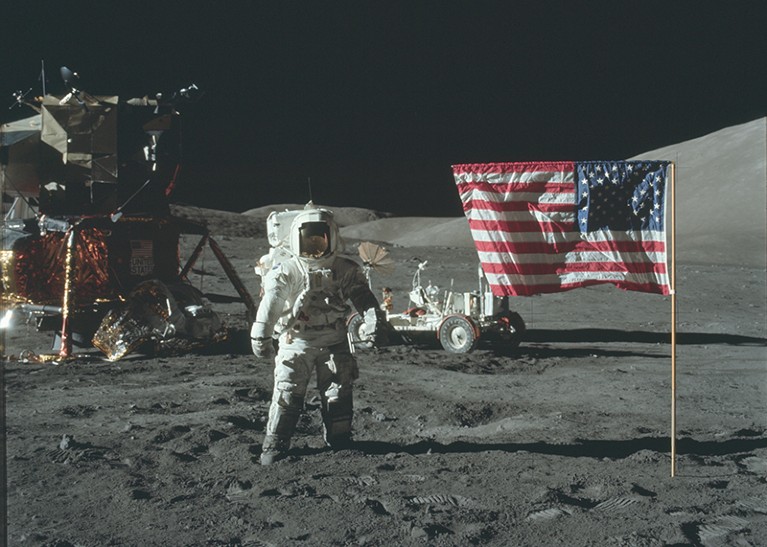Hello Nature readers, would you like to get this Briefing in your inbox free every day? Sign up here.

NASA's Apollo 17 mission to the Moon collected rock samples that scientists hope to unseal for study in the coming year. Credit: NASA
NASA to analyse Moon rocks sealed since 1972
Space scientists will this year get their gloved hands on a trove of Moon rocks collected during the 1972 Apollo 17 mission. Studies of the first pristine Apollo-era core sample to be opened in decades will help scientists to decide where next to explore on the lunar surface. “One should consider this a new mission to the Moon,” says geologist Chip Shearer.
University pays millions to lab whistleblower
Duke University will pay US$112.5 million to the US government to settle accusations of research misconduct — $33.75 million of which will go to former lab analyst Joseph Thomas. The case relates to allegations that a researcher falsified data to win grants from the US National Institutes of Health and the Environmental Protection Agency. Thomas brought the case to the courts under a US law that rewards whistleblowers who act on behalf of the government. The agreement settles the court case, but does not mean that Duke has been determined liable.
Spacesuit sizes nix all-female spacewalk
A spacewalk planned for later this week that coincidentally happened to have an all-women crew won’t reach that milestone — because of the lack of an appropriate spacesuit in a smaller size. After her first outing from the International Space Station last week, NASA astronaut Anne McClain found that the large-size torso unit that she had planned to wear didn’t fit as well as the medium-sized one — which was already earmarked for astronaut Christina Koch. “When you have the option of just switching the people, the mission becomes more important than a cool milestone,” says NASA spokesperson Stephanie Schierholz.
The New York Times | 5 min read
FEATURES & OPINION
Globe to gut: inside Big Food
Waste, obesity, pollution, soil depletion: it’s widely accepted that our food system is broken, says reviewer Felicity Lawrence. She examines three books that offer different ways of fixing it: total reinvention through technology, ending the mindless pushing of quantity over quality and returning power from agribusiness to local people.
To move or not to move: how to decide
Studies show that researchers who move countries have more citations and a broader collaboration network. But relocating isn’t an option for everybody. Five scientists explore why they decided to make the move or stay put — and share their top tips for making the right decision for you.
“Our aim is to make you die of something else”
“I couldn’t understand why you would treat someone with a fatal disease and kill them with your therapy,” says radiologist Robert Gatenby. He and his colleagues are pursuing a different approach to treating cancer: using just enough drugs to keep a tumour in check, rather than trying to eradicate it completely. The approach is less toxic to patients, costs less money — and helps to prevent cancers from evolving resistance to the drug.
Read more: Cancer therapy: an evolved approach (Nature, from 2016)
